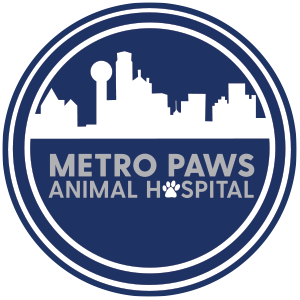Dr. Cassandra Gail Knapp
ALLERGIES IN MY PET – ARE YOU KIDDING ME?
Sadly, no. It’s not a mythical thing. Allergies can happen to your pet and in the heart of Texas, they happen a lot. Allergies come in many forms and affect both cats and dogs, purebreds and mutts.
What do allergies look like?
Allergies mainly affect two systems in the pet’s body: the skin and the digestive tract. Sometimes, both. The most obvious one is the skin. So, let’s talk skin.
Environmental allergens (grasses, pollens, dust), which we have plenty of here in Dallas, affect our pets too. These allergens land on the skin and activate the immune system. Some breeds* have more sensitive skin than others, but regardless, this immune activation triggers a severe skin reaction.
We call this atopy or atopic dermatitis. It’s a recurrent problem and first and foremost, it’s itchy. You might think your pet has invisible fleas. They will chew, bite and scratch themselves almost constantly. These itchy spells may seem seasonal, simply based on what’s in the air (or on the ground) at the time. The pet will gnaw and scratch itself, often pulling hair out in multiple places. The skin will get red and inflamed, maybe even to the point of bleeding and scabbing. The haircoat can get dry and flaky or moist and oily. Bacterial infections are common since the skin gets so damaged.
Important to know – flea saliva is an environmental allergen. Yes, fleas have spit. If your pet has an allergy to fleas, guess what? When it gets bit – by even a single flea – your dog or cat will act like it fell into a bed of ants. The tell-tale sign is itching and hair loss just above the tailbone and “flea dirt” which looks like black pepper sprinkles on the skin. (This is flea poop.)
Environmental allergens tend to respond well to treatments that protect the natural skin barrier and suppress the immune system’s “over-reaction” to a stimulant.
Symptoms can be managed and partially controlled with year-round flea control and prevention, shampoos, prescription diets, steroid therapy and/or other treatments. Apoquel stops the inflammatory pathway, calming allergic causes of skin itchiness and irritation. This tablet is not a steroid. Cytopoint is an immunotherapy injection that neutralizes IL-31, an allergic inflammatory protein in the body. It is administered as often as every 4 weeks, as needed. Referral to a veterinary dermatologist is necessary for skin allergy testing and customized allergy serum (hyposensitization) injections.
Speaking of poop…
Allergies affect the digestive tract too, often causing diarrhea. Here, the problem isn’t inhaled allergens but rather, ingested allergens. These fall into the categories of food allergy, food intolerance or food sensitivity. Some improperly call it IBS (irritable bowel syndrome), which we don’t recognize in pets. Nonetheless, the common “symptoms” are similar – one or more of weight loss, vomiting, diarrhea or itchy, inflamed skin. Yes, food allergies can affect the skin too, looking just like environmental allergies. However, food allergies are usually year-round and do not respond well to steroids. They also tend to occur at less than one year or over 6 years of age, but that’s not always the case.
Food allergies are tricky to suss out because it’s difficult to determine which ingredient(s) in the bag or can of food is causing the problem.
A hydrolyzed diet (Purina HA, Royal Canin Ultamino) will help rule in or out a food allergy. A food trial requires 8 to 12 weeks of hypoallergenic food only. NO treats, human food, or anything else can go into the patient’s mouth. After 8 weeks, we will recheck and determine if the food trial is a success. The pet can then be challenged with the original diet to see if itching returns.
*Boxer, Chihuahua, Gordon, English and Irish Setter, Yorkshire, Scottish, Wire Fox, Carin and Boston Terrier, Shar-Pei, Labrador, Golden Retriever, Westie, English Bulldog, American Cocker Spaniel, Dalmatian, Miniature Schnauzer, Shiba Inu, Beauceron, Belgian Tervuren
